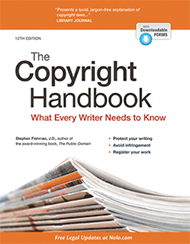After weeks, months or years of effort you have finally completed your book, play, screenplay, poem, or article. Your spouse has stopped talking to you and your children don’t recognize you. Even the family dog has grown distant. The financial sacrifices have been enormous, not to mention the emotional and intellectual strain. But it’s finished. At last, you’re an author. All that remains is to send your brainchild out into the world; a world that you’re sure will respect your work and treat you fairly. You are already trying to decide how to spend that first royalty check…
 Wait a minute! Respect your work? Treat you fairly? If that’s what you think, you’re living in a dream world. Authors’ works are habitually plagiarized, infringed upon and otherwise exploited without their permission and without fair compensation. Just as frequently, authors who are ignorant of their rights are taken advantage of by unscrupulous publishers.
Wait a minute! Respect your work? Treat you fairly? If that’s what you think, you’re living in a dream world. Authors’ works are habitually plagiarized, infringed upon and otherwise exploited without their permission and without fair compensation. Just as frequently, authors who are ignorant of their rights are taken advantage of by unscrupulous publishers.
Consider these real examples:
1. Mary writes and publishes a self-help legal book. A few months later, Mary discovers that another publisher has produced a “copycat” book without her permission containing the same structure, content, and much the same wording.
2. Fedor agrees to write a Russian language textbook for a major New York publisher. The publisher returns the completed manuscript to Fedor, claiming it is unsuitable for publication. Three years later, the publisher come out with a Russian textbook that clearly is based on Fedor’s manuscript.
3. A company hires analysts to research and write in-depth financial reports on major corporations which it sells to its clients. A weekly financial publication then publishes a column containing abstracts of Wainwright’s reports repeating almost verbatim the reports’ financial analyses and predictions.
Fortunately, the copyright laws allowed these authors to sue the bad guys and remedy the situation.
What is copyright?
Copyright is a rule created by Congress that:
- bestows exclusive ownership of a creative expression on its author, and
- allows the author to bring a thief to heel in federal court if the ownership is ripped off.
Copyright automatically exists the instant a work assumes tangible form, but the author can take additional steps to make his or her copyright ownership more secure.
More specifically, a “copyright” consists of a bundle of rights granted to authors of literary and other intellectual works. These include the exclusive right to:
- reproduce the copyrighted work,
- prepare works based on the copyrighted work (also called “adaptions” and “derivative works”),
- distribute copies of the copyrighted work to the public,
- perform the work publicly and display it publicly.
The author is the original owner of the copyright, unless the work is paid for by an employer or commissioned under a written work made for hire contract. But the author can sell some or all of these rights to someone else—as often happens when a book are article is published.
What does copyright protect?
Copyright protects on the expression in a work, not the ideas underlying the expression. The line between ideas and expression can sometimes get very thin, and many copyright disputes revolve around whether an infringed copied expression protected by copyright, or ideas that are not protected by copyright.
How long does copyright last?
Copyright lasts a long time. The copyright in works created after 1977 by individuals usually lasts for the life of the author plus an additional 70 years. The copyright in works created by employees for their employers usually lasts for 95 years from the date of publication. When a work’s copyright protection expires, it enters the public domain. “Public domain” means what it says—such works belong to the public as a whole. Anyone is free to use them any way she wishes without asking anyone’s permission.
Although copyright applies automatically to any new work, it is possible to strengthen the copyright by placing a copyright notice on the work and by registering it with the U.S. Copyright Office. These two simple steps make it a lot easier to bring a successful lawsuit in federal court against infringed work.

Copyright Protection For Other Works
This article focuses on copyright protection for works consisting wholly or primarily of words. However, copyright protects all types of expression, including: music; art, photography and sculpture; motion pictures and other audiovisual works; sound recordings; computer software programs and computer databases; pantomimes and choreographic works; and architectural works (architectural drawings and blueprints and the design of actual buildings).

The Copyright Handbook: What Every Writer Needs to Know by Stephen Fishman has been the standard work on copyright law for writers since the early 1990s. It contains all the information writers need to: register a work; maximize copyright protection; transfer ownership of copyright; avoid infringement; deal with infringers; understand the “fair use” rule; get permission to use copyrighted work; and profit from a copyright.
Buy your copy at Amazon or Nolo.com
If there was no copyright in these type of intellectual works, or the means to enforce it, there would be little economic incentive to create them. Why take the time and trouble if a work could be hijacked and sold by someone else—anyone else—without permission and without paying the author a nickel! Of course, the creative spark does not have to be economically based—and often isn’t—but for many creative people it seems only fair that they get the fruits of their efforts, if there are any fruits to get.
About the author:
 Stephen Fishman has dedicated his career as an attorney and author to writing useful, authoritative and recognized guides on the law for authors, entrepreneurs, freelancers, and other self-employed people. He is the author of over 20 books and hundreds of articles, and has been quoted in The New York Times, Wall Street Journal, Chicago Tribune, and many other publications. Among his books are The Copyright Handbook: What Every Writer Needs to Know, and Copyright and the Public Domain. His website can be found at www.fishmanlawandtaxfiles.com.
Stephen Fishman has dedicated his career as an attorney and author to writing useful, authoritative and recognized guides on the law for authors, entrepreneurs, freelancers, and other self-employed people. He is the author of over 20 books and hundreds of articles, and has been quoted in The New York Times, Wall Street Journal, Chicago Tribune, and many other publications. Among his books are The Copyright Handbook: What Every Writer Needs to Know, and Copyright and the Public Domain. His website can be found at www.fishmanlawandtaxfiles.com.
Article © 2014 Stephen Fishman | Photo © Stephen Fishman



